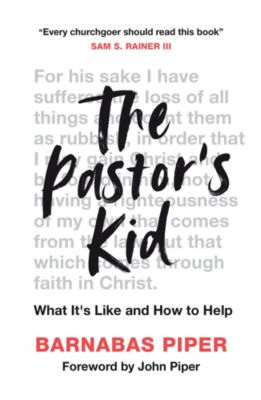
What can we do to engage our kids in spiritually meaningful and vibrant ways? Here are five family discipleship rhythms to help.
By Barnabas Piper
As a pastor, the son of a pastor, and the parent of two pastor’s kids (PKs), I often find myself pulled by competing desires. On one hand, I have a deep desire to disciple my kids well and to raise them in such a manner that they find it easy and compelling to love Jesus and His Word.
On the other hand, I want to avoid the unhelpful pastoral-parent impulse toward biblical overkill. That sounds impossible, you might think. But I assure you, there is a way to use the Bible so often and so intensely that it turns PKs off to it and makes Scripture more burdensome than life-giving.
What can we do to avoid this tragedy and engage in spiritually meaningful and vibrant family discipleship instead? I am not a parenting expert, because there is no such thing. We’re all just doing our best to be faithful. But here are five family discipleship rhythms I’ve discovered that help me faithfully point my children to Jesus without burdening them.
1. Skip family devotions
Before you close your web browser and send the site administrator an angry message, hear me out. No child has more exposure to Scripture than the child of a faithful pastor. Church attendance isn’t only mandatory but frequent. Conversations in the home revolve around things of a biblical nature often. When you have people to the house or visit someone else’s house, it is often for counsel or prayer or serious discussion. So to add a regularly scheduled time of Bible reading/teaching as a family can actually be overkill.
Be more discerning than stubbornly dedicated to a habit or schedule in your family discipleship. — @BarnabasPiper Click To TweetIt can be exhausting and exasperating to your kids, the exact opposite of how you want them to feel toward God’s Word. I’m not saying to never read the Bible with your kids (then you could send that angry message). I’m encouraging you to be more discerning than stubbornly dedicated to a habit or schedule in your family discipleship.
2. Pray with and over them
This may seem obvious, and if so, good. But let me clarify that I am not talking about praying over meals (especially not long prayers over meals; everyone hates those). I’m not talking about prayers for traveling mercies or hedges of protection. I’m talking about pointing your kids to God in the normal hard moments of life—anxiety, nightmares, conflict between friends, breakups, illness, big games, school tests, bad attitudes. And then pointing them to God in the normal joyful moments of life—beautiful weather, fun days at the lake, laughter, safe and peaceful travel, delicious dinners.
All of these are opportunities to ask for God’s help or to acknowledge His goodness. And all of them are opportunities to connect a big God who might seem distant or ethereal to the real, tangible, everyday stuff. And then you get to point to answered prayers so they can really see His hand at work.
3. Confess and repent to them
I can’t think of many things that exemplify the reality of the gospel more than confessing sin to a child and then repenting to them. It is humble. It is needy. And it is upside down because the one with the power (and who is often perceived as the spiritual authority) is putting himself at the mercy of the young and weak.
I can’t think of many things that exemplify the reality of the gospel more than confessing sin to a child and then repenting to them. — @BarnabasPiper Click To TweetI don’t just mean to confess that you are a sinner. I mean to confess sins and repent of them–losing your temper, harsh words, not listening, failing to keep your word. Show your kids your need and you are showing them your faith in God to forgive and be merciful. You are showing them the whole economy of God’s grace and that you really believe what you preach. It will draw them closer to you and to God.
4. Show them your warts and weaknesses
Like most kids, mine don’t naturally gravitate toward daily Bible reading. I can order them to do so, and I’ve tried it. I can lecture them on the necessity of it. Tried that too. And both of those things make them even less inclined to do it. But when I say, “You know what? I don’t usually want to read my Bible either,” it actually helps.
When they are mad at a jerk at school and I tell them about the times I lost my temper, it helps. When I’m warning them about the seriousness of lying and I tell them about how much dishonesty has cost me, it helps. Then it opens the door to talk about my need for God’s help, for forgiveness, and to teach them in an eye-to-eye way. Instead of hearing “you should,” they can hopefully hear “I’ve been there, and I understand.”
5. Look for the seams
Like most pastors, I love to teach and preach. Do you know who doesn’t love being taught and preached at? My kids. (At least not by me.) It bores and frustrates them, just like it bored and frustrated me when I was their age. Instead, I am learning to find the seams in life that create openings for gospel truth. When they are going through hard things, there is a seam for gospel compassion and hope. When they are celebrating and joyful there is a seam for gratitude. And when they are pursuing goals, there is a seam to talk about godly ambition and motivations. These are seams that allow us to see into their hearts a bit and inject a little bit of biblical beauty and truth at a time.
There are seams that allow us to see into our kids' hearts a bit and inject a little bit of biblical beauty and truth at a time. — @BarnabasPiper Click To TweetThis is not a complete list, and these are not foolproof strategies for family discipleship. There is no five-step process to saving your child’s soul. They are in God’s hands, and the Holy Spirit is the one who breathes life into them. Our job is to walk them into the way of the Spirit and to do so with joy and tenderness so that the gospel of Jesus Christ looks lovely to them. I pray these five steps will help you do that.

Barnabas Piper
Barnabas is a pastor at Immanuel Church in Nashville. He is a husband and the father of two daughters. He is also the author of several books, including The Pastor’s Kid and Help My Unbelief as well as a small group study, Ecclesiastes: Finding Meaning in a World of Passing Pursuits.








